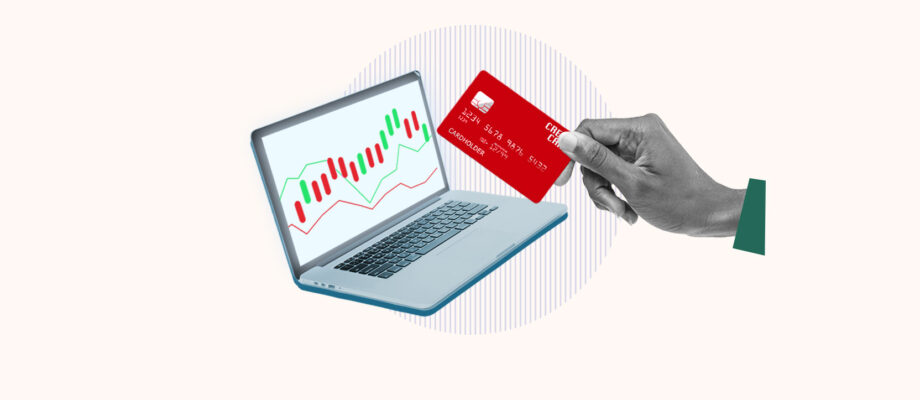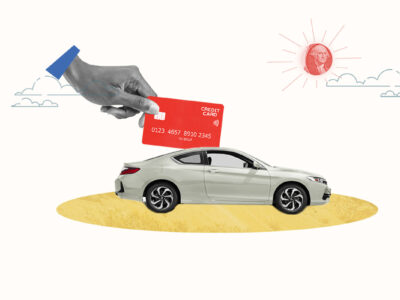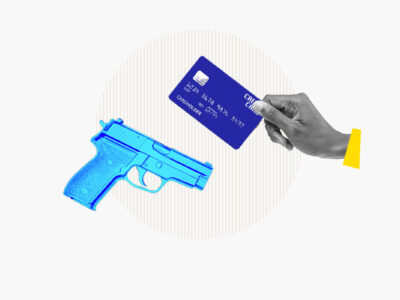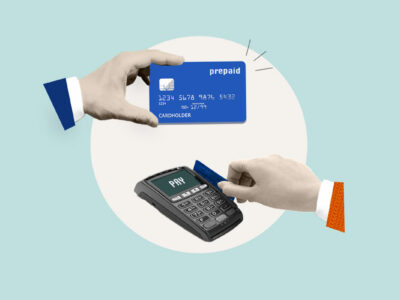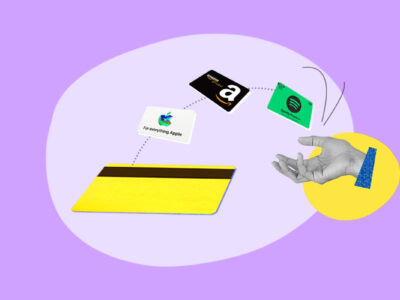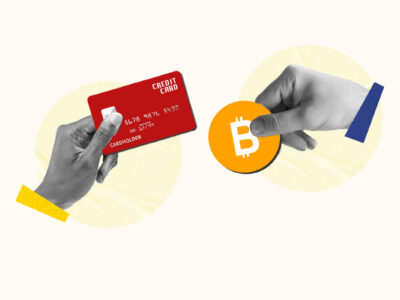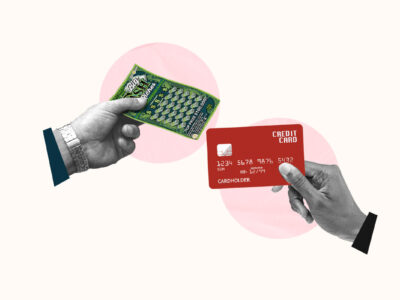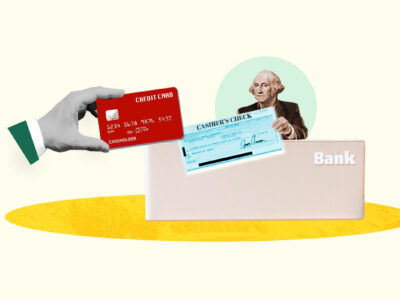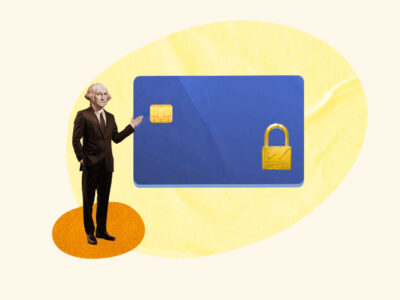If you’re getting into trading or investing, one of the first questions on your mind is probably how to buy stocks. Do you need to do anything special, or is it possible to just charge your purchases to your credit card?
The answer is that it’s technically possible to buy stock with a credit card, but it requires a complicated, multi-step process. Moreover, beyond just being difficult, it’s also a bad idea.
Why buying stock with a credit card is difficult
It’s hard to buy stock with a credit card because, unlike everyday purchases, people generally don’t buy stocks directly. Most investors work with a brokerage firm, which is a company that places orders on their behalf.
When you work with a brokerage, you have to fund your account before you can buy stock. Brokerages typically ask you to “link” a checking or savings account and transfer money from it, which makes it easy to make recurring deposits and invest regularly. Some brokers accept checks or wire transfers as well.
The vast majority of legitimate brokerages don’t accept credit card payments. There are no actual laws against it—most brokers simply don’t want to do it.
For instance, you can’t use your credit card to buy stock with any of the following brokerages:
- Charles Schwab
- E*TRADE
- Fidelity Investments
- Interactive Brokers
- Merrill Edge
- Robinhood
- SoFi
- TD Ameritrade
- Vanguard
Why don’t most brokers accept credit card payments?
For a brokerage, accepting credit card payments would be a headache with no real upside.
It would require them to pay credit card transaction fees and assume a certain amount of risk (e.g., that you’ll dispute the transaction later or claim that you were the victim of credit card fraud). As a result, most brokers simply choose not to allow this type of transaction.
Be skeptical of any brokerage that asks you to use your credit card
Because so few brokers take credit card payments, when one does, it’s a red flag. If a brokerage allows (or requests) you to fund your account with a credit card, proceed with caution. It might be a scam.
Workarounds that let you buy stock with a credit card
Although it’s nearly impossible to find a legitimate brokerage that will take credit card payments, there are two workarounds that will let you buy stock with a credit card.
Note that we don’t recommend either of these methods, since they come with serious downsides. Paying for stocks with a credit card is virtually always a bad idea. However, here’s how you can do it:
1. Fund a brokerage account with a cash advance
Many credit cards will allow you to perform something called a cash advance. This is a way to get cash from your credit card—essentially just borrowing money at an ATM.
It’s possible to take out a cash advance, deposit it in a checking account, and use it to fund your brokerage account. You can then use the money to buy stock.
Your brokerage won’t object because they have no way of knowing the money came from your credit card at all. That will remain between you and your credit card company. All your brokerage will see is the cash.
Again, we strongly discourage this method. For several reasons, it’s much more expensive than buying stocks normally, and it can hurt your credit score. We’ll go into detail about the downsides further on in this article.
2. Buy gift cards with Stockpile
There is one brokerage firm, Stockpile, that accepts credit card payments. Contrary to what some websites say, you can’t actually directly fund a Stockpile account with your card. However, Stockpile sells gift cards that you can redeem to receive shares in various companies.
This enables you to perform another workaround: you can use your credit card to buy a Stockpile gift card for yourself. When you redeem it, you’ll receive stock that you paid for with your credit card.
To pull this off, you need an account with Stockpile (you can’t buy a Stockpile gift card and redeem it with another brokerage). This is a serious downside, since Stockpile charges a monthly membership fee of $4.95, in contrast to many other brokerages, which are free. 1
It’s possible to transfer your investment account from Stockpile to another broker once you redeem your gift cards, but doing so is a hassle, and it will usually cost money. 2
Your Stockpile purchase may be treated as a cash advance
Although you’re usually allowed to buy gift cards with a credit card, many card issuers will treat the transaction as a “cash-like transaction.”
This means that using this Stockpile strategy will often have most of the same downsides as buying stock with an ordinary cash advance (described in more detail below).
Why you should never buy stock with a credit card
Using a credit card to buy stock comes with several serious downsides:
1. It’s risky and expensive
Most of the time, when people buy stock, it’s because they’re investing—meaning they plan on holding it for years in the hopes that it will gradually increase in value. In other words, they’re looking to grow their money over time, not to get rich overnight.
With a strategy like this, it’s important to invest your money as efficiently as possible. Buying stock with a credit card isn’t efficient. It comes with a lot of added expenses, including:
- Interest charges: You have to pay extra charges (called interest) on purchases you make with a credit card. Ordinary purchases don’t accrue interest right away, so you can avoid paying extra if you always pay your credit card off in full each month, but on many cards, cash advances start accruing interest immediately. Even worse, cash advances often have higher interest rates than other transactions.
- Added fees: Many credit card issuers will also hit you with a fee every time you take out a cash advance, e.g., $10 or 5% of the transaction amount. This means that when you buy stock with a credit card, you’re effectively getting less for your money because a portion of it will have to go towards that fee.
All of this will eat into your investment returns. When you invest with cash from your credit card, it’s much harder to turn a profit than when you use your own money.
If you’re planning on trading rather than investing, aka buying stocks or stock options in the hopes of making a quick profit, that’s an even worse idea. Doing this with a credit card is essentially gambling with borrowed money, which is exactly as risky as it sounds.
2. It might hurt your credit score
Buying stock with a credit card has the potential to damage your credit score in several ways:
Raising your credit utilization
Your credit utilization rate reflects how much of your credit you’re using. Using less credit is better for your credit score. Most experts recommend using under 30% of your credit limit, and under 10% if at all possible.
Buying stock with your credit card can easily raise your utilization rate to dangerously high levels unless you stick to buying very small amounts and paying your card off quickly.
Increasing your risk of making late payments
There are no guarantees when it comes to investing or trading. When you put money into the market, there’s always a chance that you’ll lose it.
This means that you might end up not being able to pay off your debts. If this happens, you’ll receive black marks on your credit report, which will be deadly to your credit score. The longer you go without paying, the more derogatory marks you’ll receive.
Consistent failure to pay may have other consequences as well, such as lawsuits from your credit card company (or a debt collector, if your card issuer gets tired of trying to collect the money you owe on their own).
3. You won’t earn rewards
If your rationale for buying stock with a credit card is that you want to earn credit card rewards, think again. Most cards specifically exempt cash advances from their rewards programs.
Cash advances have these downsides because they really just aren’t meant for this type of purchase. They’re meant for emergencies when you need cash in a hurry, not for circumventing restrictions and buying things that you can’t ordinarily use a credit card to get.
If you’re looking to get into investing or trading, the best way to do it is to play by your brokerage’s rules: link your checking account and fund your investment account with money that’s actually yours, not money that you’re borrowing on credit.
Does buying stock with a credit card have any special tax implications?
Investing always has tax implications, but doing it with a credit card doesn’t affect how much tax you’ll have to pay.
There are several taxes you can trigger when you buy, hold, or sell stocks. For instance, when you sell them, it can trigger something called a capital gains tax (if they gained in value and you turned a profit by selling them).
Also, if you own shares of a company or fund that pays dividends, those can either count as capital gains or income. You may need to factor them into how much of your regular income tax you pay.
Always do your research
If you’re getting into investing or trading, you should definitely look into how your strategy will affect your taxes, and consider speaking to a certified public accountant (CPA).
However, again, the way you pay for your stocks won’t directly affect your taxes. (However, buying them with a credit card technically might reduce your tax burden, in the sense that it makes it much less likely you’ll make any money to begin with.)
